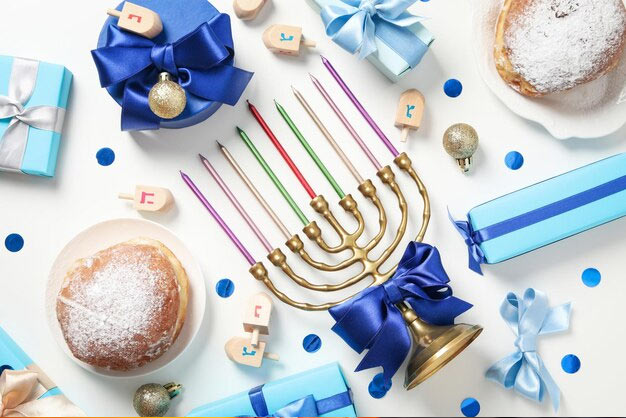Hanukkah in the USA
Hanukkah, known as the Festival of Lights, is a vibrant celebration that carries profound meaning for Jewish communities globally. In the United States, a nation characterized by its diversity, Hanukkah transcends mere religious observance, serving as an occasion for cultural expression, familial connections, and community involvement.

Hanukkah marks the rededication of the Second Temple in Jerusalem and the miraculous occurrence of oil that burned for eight days. This significant historical event embodies resilience and faith, serving as an essential aspect of Jewish identity. In the United States, the holiday rose to prominence in the early 20th century, particularly within immigrant communities, and has since transformed into a lively celebration.
Customs and tradition
Lighting of the Menorah: At the heart of Hanukkah festivities lies the menorah, which features nine branches. Each night, one more candle is lit, resulting in a fully illuminated menorah by the conclusion of the eighth night. It is customary for families to unite in reciting blessings, singing songs, and exchanging stories that reflect the holiday's significance.
Dreidel games: The dreidel, a spinning top with four sides, serves as an enjoyable pastime during the Hanukkah celebration. Each face of the dreidel features a Hebrew letter that signifies "A great miracle happened there." Children as well as adults take pleasure in engaging in dreidel games, frequently wagering chocolate gilt as their stakes.
Delicious foods: The role of food is crucial in the observance of Hanukkah. Traditional foods such as latkes, or potato pancakes, and sufganiyot, which are jelly-filled doughnuts, are commonly served. These items are fried in oil to celebrate the oil’s miracle. Families often unite to cook and relish these special treats, promoting a spirit of togetherness.
Giving of gifts: Gift-giving, while not a traditional aspect of Hanukkah, has emerged as a valued practice, especially within families that have children. This exchange is commonly observed on every night of Hanukkah, enriching the overall festive ambience.
Community celebrations
In numerous cities across the United States, Hanukkah is commemorated through public events that unite individuals from various backgrounds. Common activities include menorah lighting in communal areas, communal meals, and educational initiatives. Such gatherings not only enhance community bonds but also promote interfaith dialogue and understanding.
1. Menorah lighting in public places
Numerous cities organize significant menorah lighting ceremonies, frequently featuring music, culinary offerings, and various festive activities. These gatherings encourage community participation in the celebration, highlighting the richness of Jewish traditions.
2. Cultural programs
During Hanukkah, organizations such as Chabad and nearby Jewish community centres commonly arrange cultural activities. These events often include storytelling, educational workshops, and performances that pay tribute to Jewish heritage.
3. Charitable giving
Tzedakah, which refers to charity, plays a vital role in Jewish culture. Throughout the Hanukkah season, numerous families prioritize contributing to their communities, reflecting the values of generosity and compassion that the holiday encourages.
The experience of Hanukkah in the modern age
In the current digital landscape, the observance of Hanukkah in the United States has embraced technological advancements. Online gatherings, virtual menorah lighting events, and social media outreach enable families and friends, regardless of their physical separation, to stay connected. This combination of age-old customs and modern practices ensures that the significance of Hanukkah endures, even in a rapidly evolving world.
Conclusion
Hanukkah in the United States embodies a vibrant blend of tradition, community, and festivity. It stands as a testament to resilience, faith and the significance of unity. As families illuminate their menorahs and partake in the celebrations, they not only pay tribute to their cultural heritage but also cultivate a sense of belonging and happiness that spans generations. Whether through the warmth of home celebrations or the excitement of public festivities, Hanukkah continues to illuminate the nation.